When the Power Goes Out... Have a Black Out Kit
By Alice Osborne
 Survival and preparedness expert, John Rourke ModernSurvivalonline.com) reminds us that there are a lot of things that cause power outages: utility problems, winter storms, lightning strikes, wind storms, and grid overload. And these an happen during any season of the year. Whatever the cause, losing power creates inconvenience and discomfort.
Survival and preparedness expert, John Rourke ModernSurvivalonline.com) reminds us that there are a lot of things that cause power outages: utility problems, winter storms, lightning strikes, wind storms, and grid overload. And these an happen during any season of the year. Whatever the cause, losing power creates inconvenience and discomfort.
Rourke says that depending upon your geographic location, housing type, environment, and overall health, power outages can range from a minor inconvenience to a serious threat. For instance, summer heat can be serious threat to the elderly without air conditioning, and frigid winters are a threat to everyone when the furnace doesn't work.
 In 1989 Rourke saw the effect that Hurricane Hugo had as it knocked out power in the Charlotte, NC area. Some areas were without power for up to 3 weeks. Water pumps didn't run, gas stations couldn't pump fuel, unconsumed food in refrigerators and freezers went bad. He says people were sadly unprepared and it was a painful and miserable experience.
In 1989 Rourke saw the effect that Hurricane Hugo had as it knocked out power in the Charlotte, NC area. Some areas were without power for up to 3 weeks. Water pumps didn't run, gas stations couldn't pump fuel, unconsumed food in refrigerators and freezers went bad. He says people were sadly unprepared and it was a painful and miserable experience.
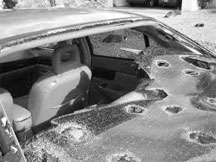 In 2011 southeastern United States experienced severe weather and he was caught in the middle of it. Softball-sized hail fell and caused severe damage to homes and vehicles. In his area power was lost to thousands of households for several days. Then there was the October, 2011 snowstorm that traveled up the East Coast and caused over 2 million people to lose power.
In 2011 southeastern United States experienced severe weather and he was caught in the middle of it. Softball-sized hail fell and caused severe damage to homes and vehicles. In his area power was lost to thousands of households for several days. Then there was the October, 2011 snowstorm that traveled up the East Coast and caused over 2 million people to lose power.
These types of storms and corresponding power failures create not just tremendous property damage, but extreme life disruption as well. They seem to be happening more and more frequently, so Rourke has some great advice for us. He says we can prepare ahead by putting together a Black Out Kit (BOK) - something that can make dealing with most any power failure easier and safer.
A BOK often can be made with items that are already found in most households. The goal is to have a single designated location for this kit so we can find our supplies and act calmly and effectively in response to a power failure. Take a look at Rourke's 2 suggestions and seriously consider following his advice.
Example: BOK #1
BOK #1 supply list:
 Qty: 1 Flashlight, large (wide beam spotlight)
Qty: 1 Flashlight, large (wide beam spotlight)
Qty: 1 LED Maglite, D cell
Qty: 2 Lanterns, battery operated
Qty: 3 Flashlights, LED - small
Qty: 5 Lightsticks
Qty: 2 Candles, pillar
Qty: 2 Candles, jar - large
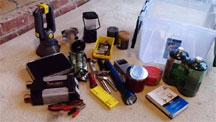 Qty: 24 Tealights
Qty: 24 Tealights
Qty: 1 Can opener
Qty: 2 Propane canisters
Qty: 1 750 watt inverter
Qty: 1 AM/FM radio, battery operated
Qty: 1 DVD player, portable
Qty: 2 Butane lighters
Qty: 4 Matches, box
******Extra batteries for all
Example: BOK #2
BOK #2 supply list:
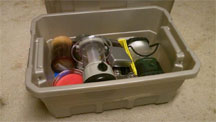 Qty: 2 Lanterns, battery operated
Qty: 2 Lanterns, battery operated
Qty: 1 can opener
Qty: 3 Flashlights, LED - small
Qty: 1 AM/FM radio, battery operated
Qty: 5 Lightsticks
Qty: 2 Butane lighters
 Qty: 2 Candles, pillar
Qty: 2 Candles, pillar
Qty: 4 Matches, box
Qty: 2 Candles, jar - large
Qty: 24 Tealights
**** Extra batteries for all
Let's review the contents of these kits:
Flashlights: Flashlights, the basic building block to a BOK, are invaluable. Quality and brightness of flashlights are getting better all the time and many now use LED bulbs which are extremely durable, super bright, and use very little power. When you find yourself in the dark, you need bright lights that will last as long as possible. LED lights are highly recommended.
 Battery Operated Lanterns: Very much like flashlights described above, these provide light over a wider area and work exceedingly well. Oil lamps also work well but they carry a risk of fire. So while LED lanterns are more expensive, they provide much more light and only sip power out of batteries.
Battery Operated Lanterns: Very much like flashlights described above, these provide light over a wider area and work exceedingly well. Oil lamps also work well but they carry a risk of fire. So while LED lanterns are more expensive, they provide much more light and only sip power out of batteries.
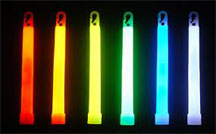 Lightsticks: Chemically activated, these provide no heat and use no energy but do provide dim light for several hours. These liquid-filled plastic tubes are bent and shaken to activate. They are very popular with kids and are a good way to calm them when things get stressful. Lightsticks are inexpensive, but they do have an expiration date, so check the package.
Lightsticks: Chemically activated, these provide no heat and use no energy but do provide dim light for several hours. These liquid-filled plastic tubes are bent and shaken to activate. They are very popular with kids and are a good way to calm them when things get stressful. Lightsticks are inexpensive, but they do have an expiration date, so check the package.
Candles: SAFETY is the FIRST concern. Burning candles obviously exposes the environment to open flame and it only takes a moment to ignite the wrong thing and the power outage now becomes much more serious. With that said, candles can be used safely to provide soft light to illuminate areas for a long period of time. Jar candles are preferred.
Can Opener: Most any household contains enough food to last a family 3-4 days. Commonly much of that food is in cans, so remember, when the power fails, electric can openers will no longer work. Having a manual can opener - a simple and inexpensive tool - is the best back-up plan.
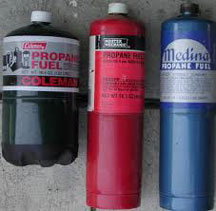 Propane Canisters: Cooking becomes more challenging without electricity. An inexpensive portable camp stove that runs on small propane canisters is the answer. It can be used outside to cook very similar to a conventional stove top.
Propane Canisters: Cooking becomes more challenging without electricity. An inexpensive portable camp stove that runs on small propane canisters is the answer. It can be used outside to cook very similar to a conventional stove top.
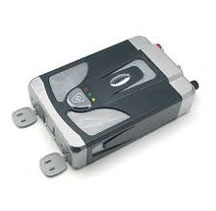 750 Watt Power Inverter: An Inverter is a fantastic device which converts DC power (battery) to AC power (household). The inverter makes it possible to operate a variety of devices: box fans, electric lights, small power tools, and other electronic devices such as radios and computers.
750 Watt Power Inverter: An Inverter is a fantastic device which converts DC power (battery) to AC power (household). The inverter makes it possible to operate a variety of devices: box fans, electric lights, small power tools, and other electronic devices such as radios and computers.
 Battery Operated AM/FM Radio: Access to news during a black out is critical, depending on the nature of the situation. Having a small battery powered AM/FM radio with spare batteries will provide access to news updates as well as entertainment. In addition to the common AM/FM bands, some radios receive special weather bands which provide weather forecasts and emergency information 24 hours a day.
Battery Operated AM/FM Radio: Access to news during a black out is critical, depending on the nature of the situation. Having a small battery powered AM/FM radio with spare batteries will provide access to news updates as well as entertainment. In addition to the common AM/FM bands, some radios receive special weather bands which provide weather forecasts and emergency information 24 hours a day.
Butane Lighters and Matches: A butane lighter and/or matches are needed for lighting candles and oil lamps or starting a camp stove.
Extra Batteries: It is very important to store extra batteries for each battery-powered device. Put away several spares and always buy high quality alkaline.
 Portable DVD Player: While not a necessity, it's a kid-calmer and boredom-buster. Most models plug into a vehicle cigarette lighter adapter for recharging and can play an entire movie when fully charged.
Portable DVD Player: While not a necessity, it's a kid-calmer and boredom-buster. Most models plug into a vehicle cigarette lighter adapter for recharging and can play an entire movie when fully charged.
The bottom line to putting together your own BOK is to consider your own situation and build it as big or as small as you wish.
Now a few other things to consider:
 • DO NOT open refrigerators and freezers unless absolutely necessary. Every time they are opened valuable cold air escapes.
• DO NOT open refrigerators and freezers unless absolutely necessary. Every time they are opened valuable cold air escapes.
 • Store foods that simple meals can be made from: soup, pasta and spaghetti sauce, canned tuna, and peanut butter and jelly. Hot cocoa, coffee, and herbed teas are also welcome additions.
• Store foods that simple meals can be made from: soup, pasta and spaghetti sauce, canned tuna, and peanut butter and jelly. Hot cocoa, coffee, and herbed teas are also welcome additions.
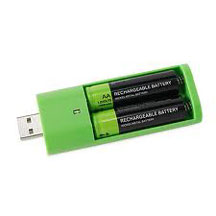 • USB Battery Chargers - With so many devices capable of being charged via USB plugs, have a couple of USB adapters that can plug into the cigarette lighter or 12V power outlet in your vehicle. Being able to charge up a tablet PC, cell phone, or book reader is a smart way to cope with the grid down.
• USB Battery Chargers - With so many devices capable of being charged via USB plugs, have a couple of USB adapters that can plug into the cigarette lighter or 12V power outlet in your vehicle. Being able to charge up a tablet PC, cell phone, or book reader is a smart way to cope with the grid down.
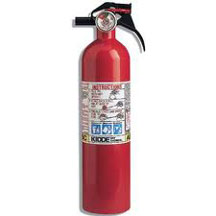 • Fire Extinguisher - You never know what may happen, and lighting matches and using candles certainly increases the risk of fire.
• Fire Extinguisher - You never know what may happen, and lighting matches and using candles certainly increases the risk of fire.
 Generators are certainly a welcome addition to supplies when the power fails. Even small generators often can power a refrigerator along with a few other things at the same time. Before purchasing read up on what your power requirements are and make sure you have plenty of fuel stored away.
Generators are certainly a welcome addition to supplies when the power fails. Even small generators often can power a refrigerator along with a few other things at the same time. Before purchasing read up on what your power requirements are and make sure you have plenty of fuel stored away.
 • Extras for helping neighbors - It is very likely that your neighbors will be less prepared than yourself. Be the hero and store a few extra flashlights and batteries to help your neighbor.
• Extras for helping neighbors - It is very likely that your neighbors will be less prepared than yourself. Be the hero and store a few extra flashlights and batteries to help your neighbor.
 • Heat in the Winter - Portable propane heaters using the same canisters that a camp stove uses are fantastic for heating small areas. Kerosene heaters also work well. Either one require that fuel be stored away for use later.
• Heat in the Winter - Portable propane heaters using the same canisters that a camp stove uses are fantastic for heating small areas. Kerosene heaters also work well. Either one require that fuel be stored away for use later.
It is not a question of when the power will go out - but for how long and how bad the situation will be. Regardless, the better you prepare now, the easier it will be to deal with later on.

